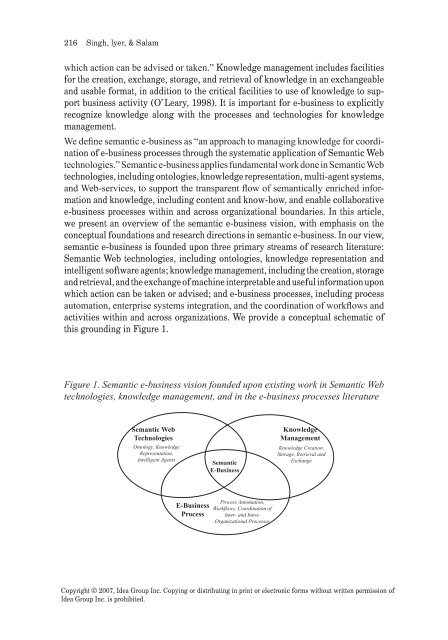Semantic Web-Based Information Systems: State-of-the-Art ...
Semantic Web-Based Information Systems: State-of-the-Art ...
Semantic Web-Based Information Systems: State-of-the-Art ...
Create successful ePaper yourself
Turn your PDF publications into a flip-book with our unique Google optimized e-Paper software.
S ngh, Iyer, & Salam<br />
which action can be advised or taken.” Knowledge management includes facilities<br />
for <strong>the</strong> creation, exchange, storage, and retrieval <strong>of</strong> knowledge in an exchangeable<br />
and usable format, in addition to <strong>the</strong> critical facilities to use <strong>of</strong> knowledge to support<br />
business activity (O’Leary, 1998). It is important for e-business to explicitly<br />
recognize knowledge along with <strong>the</strong> processes and technologies for knowledge<br />
management.<br />
We define semantic e-business as “an approach to managing knowledge for coordination<br />
<strong>of</strong> e-business processes through <strong>the</strong> systematic application <strong>of</strong> <strong>Semantic</strong> <strong>Web</strong><br />
technologies.” <strong>Semantic</strong> e-business applies fundamental work done in <strong>Semantic</strong> <strong>Web</strong><br />
technologies, including ontologies, knowledge representation, multi-agent systems,<br />
and <strong>Web</strong>-services, to support <strong>the</strong> transparent flow <strong>of</strong> semantically enriched information<br />
and knowledge, including content and know-how, and enable collaborative<br />
e-business processes within and across organizational boundaries. In this article,<br />
we present an overview <strong>of</strong> <strong>the</strong> semantic e-business vision, with emphasis on <strong>the</strong><br />
conceptual foundations and research directions in semantic e-business. In our view,<br />
semantic e-business is founded upon three primary streams <strong>of</strong> research literature:<br />
<strong>Semantic</strong> <strong>Web</strong> technologies, including ontologies, knowledge representation and<br />
intelligent s<strong>of</strong>tware agents; knowledge management, including <strong>the</strong> creation, storage<br />
and retrieval, and <strong>the</strong> exchange <strong>of</strong> machine interpretable and useful information upon<br />
which action can be taken or advised; and e-business processes, including process<br />
automation, enterprise systems integration, and <strong>the</strong> coordination <strong>of</strong> workflows and<br />
activities within and across organizations. We provide a conceptual schematic <strong>of</strong><br />
this grounding in Figure 1.<br />
Figure 1. <strong>Semantic</strong> e-business vision founded upon existing work in <strong>Semantic</strong> <strong>Web</strong><br />
technologies, knowledge management, and in <strong>the</strong> e-business processes literature<br />
<strong>Semantic</strong>.<strong>Web</strong><br />
Technologies<br />
Ontology, Knowledge<br />
Representation,<br />
Intelligent Agents<br />
E-Business.<br />
Process<br />
<strong>Semantic</strong>.<br />
E-Business<br />
Process Automation,<br />
Workflows, Coordination <strong>of</strong><br />
Inter- and Intra-<br />
Organizational Processes<br />
Knowledge.<br />
Management<br />
Knowledge Creation,<br />
Storage, Retrieval and<br />
Exchange<br />
Copyright © 2007, Idea Group Inc. Copying or distributing in print or electronic forms without written permission <strong>of</strong><br />
Idea Group Inc. is prohibited.


